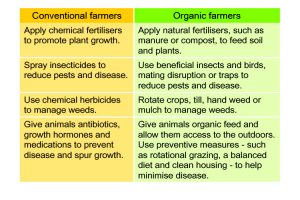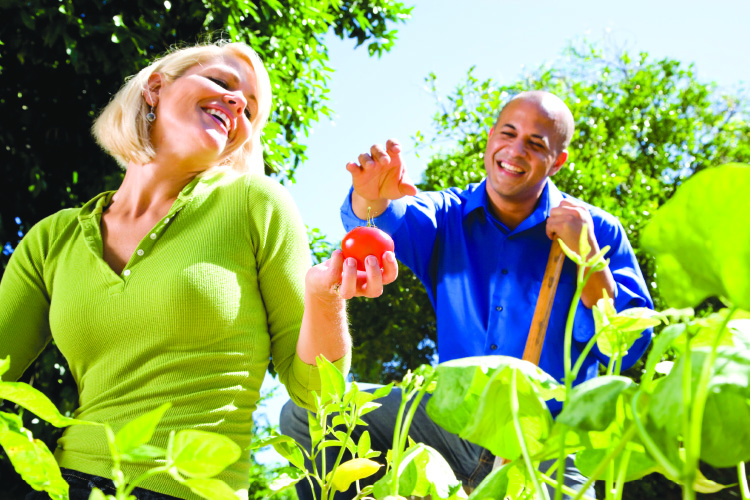Go Organic: Healthy Body, Healthy Planet
The last two decades, healthy eating and organic foods have become nearly synonymous with consumers’ appetite for better health, and a chance to save the plane. The call has been growning increasingly voracious.
But should you go organic? On one side, organic food has all the positive points, but on the other hand, it is also expensive, at least for now. So how do you choose? The best part is you don’t have to go organic in a big way. You can learn a handful of simple steps to live a more chemical-free, healthier life, and by doing so, make our planet a better place to live in.
Table of Contents
What is Organic?
Let’s first understand the definition of ‘Organic’. In the U.S., effective 21 October 2002, all agricultural farms and products claiming to be organic must be guaranteed by a USDA-approved independent agency to meet the following guidelines:
- Abstain from the application of prohibited materials (including synthetic fertilisers, pesticides, and sewage sludge) for 3 years prior to certification and then continually throughout their organic license.
- Prohibit the use of genetically modified organisms and irradiation.
- Employ positive soil building, conservation, manure management and crop rotation practices.
- Provide outdoor access and pasture for livestock.
- Refrain from antibiotic and hormone use in animals.
- Sustain animals on 100% organic feed.
- Avoid contamination during the processing of organic products.
- Keep records of all operations.

Benefits of an Organic Lifestyle
Living organic provides a happy, healthy, and chemical-free family regimen that helps conserve the Earth’s resources. Leading an organic life is more than the consumption of organically produced food, however, it includes encompassing a total eco-friendly system with aspects such as recycling, saving energy, and buying other organic products such as furniture and linen.
For a time, the organic lifestyle was exclusive to a limited number of people, but as the public consciousness grows and organic products become available in all the leading supermarkets, more people are attracted to and adapt an organic lifestyle. One of the latest trends to have optimum control over the quality of organic fruit and vegetables people consume has been organic farming. Typically, organic farming can be quite costly and time consuming when compared to old, conventional farming methods. The final product, however, is chemical-free, better tasting, and healthier produce. The entire process, including fertilisation and pest control, is eco-friendly.
Why Going Organic Makes Good Sense
Simple habits, particularly those cemented over a lifetime can be difficult to change, what’s more dietary habits – but it’s never too late to start. What you put in your body, that is who you are and what you become. So it’s really important to put in good things and live a healthy, disease-free live. If you have misgivings about going organic, here’s a list of common concerns, with advice on how to resolve them.
Cost:
“Only rich people can afford to eat organic food”. Have you heard that one before? Price factor may well be the No. 1 barrier preventing many from eating organically grown and raised food items. We can go on forever on the economic reasons factory farms and agribusiness can produce foods that costs so little. Basically it’s a question of where to spend your money: on staying healthy by avoiding pesticides and additives, or on medicines and the doctor when you get sick.
Feasibility:
Going organic doesn’t have to be completely changing your whole life. You could add one item at the start and then in a month, add the next. If you like chicken, commit yourself to buying only chicken that’s organic. If you drink a lot of milk, make the milk organic. If you do that in a regular way, after one year you’ll realise most of the important things you buy are organic.
Complexity:
Under U.S. standards, foods earn organic ratings (See Certified Organic Label Guide) based on how they were raised or grown, or the percentage of organic ingredients in processed products. So read labels carefully, and bear in mind that foods marked “natural” are not certified organic; that foods marked “locally grown” aren’t necessarily organically grown; and that many foods stocked in “whole food” stores may be grown and produced no more healthfully than similar items in traditional supermarkets.
Timing:
Organic food, especially organic produce, is not that much more expensive than conventionally raised produce if you buy it seasonally. If you go like nature intended and eat, for example vegetables that are readily available rather than exotic, they would not be very expensive.
Nutrition:
If you eat more nutritional foods produced and prepared in a more healthful way, then you don’t need to eat as much food because you are satiated earlier. The older we get, the smaller our portions should get because our metabolism slows down.
If you’re planning to go organic, remember this – “Don’t give up”. As you adjust your eating and living habits, nothing will happen quickly. But slowly and steadily, the changes will have an impact on your health and how you feel.
7 Reasons to Choose Organic Now
Organic is great for your well-being and the environment, is kind to animals and wildlife and allows us make a big difference – simply through the way we shop.
1. More Nutritious
Organic food, particularly raw and unprocessed food, contains higher levels of vitamins (such as beta carotene, C, D and E), cancer-fighting antioxidants, and essential minerals.
2. Sustainable Practice
The native American Indians believe that one should be able to find food and nourishment within a 5 km radius of one’s home. In supporting local and organic, we help the local economy and drive demand for sustainable practices.
3. Food you can trust
Hydrogenated fats and controversial additives including aspartame, tartrazine, MSG are banned under organic standards.
4. Sustainable Practices
Organic farming releases less greenhouse gases than non-organic farming – choosing organic, local and seasonal food can significantly reduce your carbon footprint.
5. Animal welfare
Organic standards insist that animals are given plenty of space and fresh air to thrive and grow – guaranteeing a truly free-range life.
6. Protecting wildlife
Organic farms are havens for wildlife and provide homes for bees, birds and butterflies.
7. GM-free
Genetically modified crops and ingredients are banned under organic standards. You may be surprised to know that over a million tonnes of GM crops are imported by many countries each year to feed the majority of non-organic livestock which produce pork, bacon, milk, cheese and other dairy products.





















Leave a comment